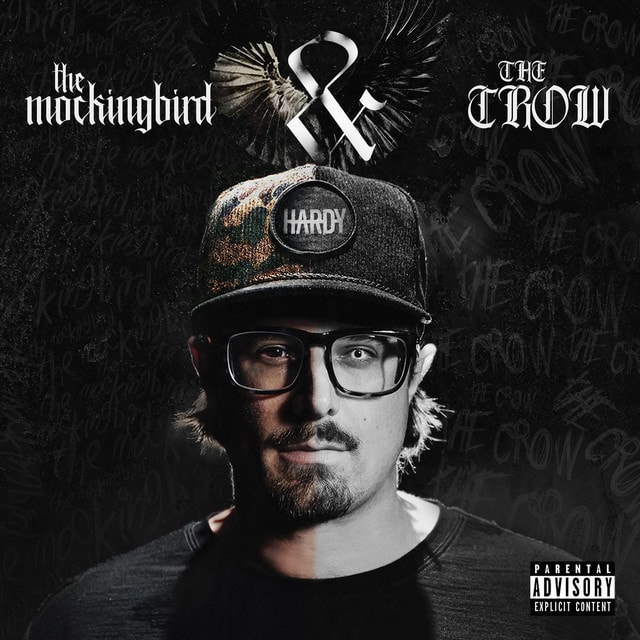Opinion | The elusive single genre
January 25, 2023
It’s been a while since I’ve felt so compelled to sit down and write about an album, but something about HARDY’s new album “the mockingbird & THE CROW” stuck with me.
The album begins with well-written but cliche country songs about beer, small towns and trucks that I would expect from HARDY based on the songs I’ve heard from him in the past, and it ends with rock and metal songs, about similar subjects, that warrant their all-caps titles.
HARDY’s talent as a writer has never been a secret, but by bringing a very different flavor to country music in this album while sticking with common themes, he adds something new and unique to the landscape of country music.
His observations about country music, the lifestyle it represents, and the industry are conspicuous throughout the album. Through tracks like “here lies country music,” “the mockingbird & THE CROW” and “RADIO SONG (feat. Jeremy McKinnon),” HARDY seems to both pay homage to traditional country music and criticize its constraints.
In “here lies country music,” HARDY pays homage to traditional country music, Jack Daniel’s, steel guitar and all, and says “I pray that I leave this world before country music does.” He sings, “It had a couple close calls with names that I won’t mеntion / But it stayed strong with ‘Always On My Mind’ and ‘Family Tradition,’” indicating that people have tried to change the genre throughout its history and praising some of its most influential artists for saving the genre and its traditions. Yet, HARDY ironically bends the genre into a new shape himself as the album continues after this eighth track concludes what would be considered the traditional country half.
The song that transitions the album from a classic country sound to a much heavier, more aggressive rock sound is the titular song of the album, in which HARDY refers to himself as a mockingbird with a microphone, “singing songs that sound like other songs you’ve heard” before switching it up, both musically and lyrically.
As the instrumental part of the song transitions to a chord progression that is almost reminiscent of Nirvana’s recognizable grunge sound, HARDY’s style changes completely. He screams profanities at the end of the first verse and proceeds to sing, “And I refuse to be another / Mockingbird with a microphone / I’ll fly the line I choose to, brother / Even if that makes me the crow.” In an edgy and intriguing 180-degree turnaround, HARDY basically gives the genre of traditional country music — the genre whose conventions and icons he praised just minutes earlier — the finger.
It is almost as if the hypothetical funeral for country music HARDY describes in “here lies country music” is not for the genre but for his place within its most fundamental traditions — at least from a musical standpoint.
While his sound enters the territory of rock and heavy metal throughout the second half of the album, his lyrics continue to focus on the staples of country music: trucks, whiskey, guns and other lifestyle references one would predict in a track entitled “THE REDNECK SONG.”
Growing up in the San Francisco Bay Area, I barely listened to country music, and I never listened to classic country music. When I moved to Alabama, I sensed a shift within myself and my musical tastes. What was once a genre that I felt I could hardly relate to became a genre that actually described my current environment better than any other musical style could.
Country music quickly became my go-to genre of music, and since I wasn’t raised on country music, my go-to artists were newer country artists, some of whom tend not to be too concerned with maintaining a traditional country sound. My favorite genre, if I had to choose and define one, would be the country-pop fusion that most older country fans, the ones who probably identify most with HARDY’s “here lies country music,” often disdain. It represents a shift away from the traditional conventions of a genre, and that scares a lot of people who identify closely with those conventions.
Nonetheless, country music is not dead. In fact, I think HARDY’s album clearly illustrates just how alive it is. While I personally would consider a majority of the songs to be either too country or too metal for me, I actually really enjoyed the album. It was different, and it left me with a lot to think about.
Art has always been about subversion, about challenging conventions and traditions, and, as someone who loves listening to new musical styles, I am curious to know what traditional country fans, and traditional rock and metal fans, would have to say about HARDY’s artistry.
I could identify with HARDY’s authenticity, even when some of the lyrics and music were far from the sound of my usual playlist, and that reality gave me a lot of respect for him as an artist. If “the mockingbird & THE CROW” indicates where country music is headed, as far as the possibilities for pushing the boundaries of traditional genres, I’m certainly excited.











